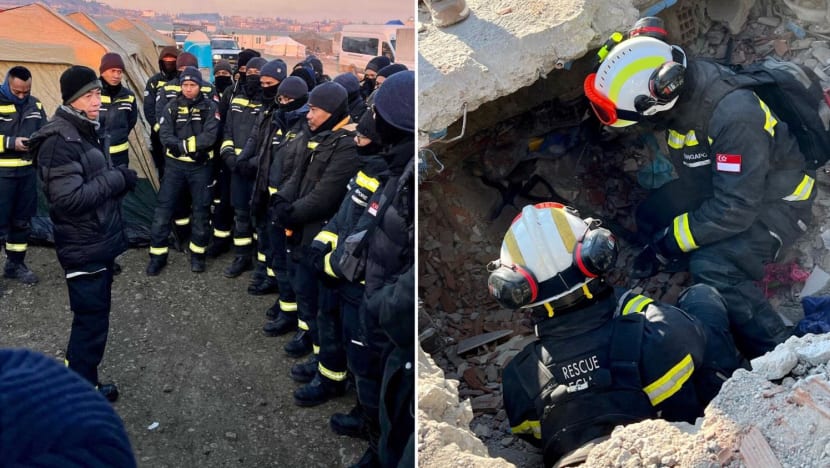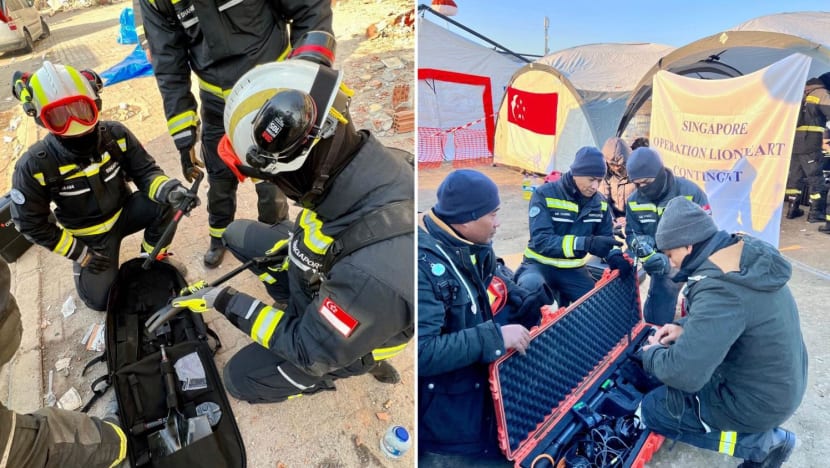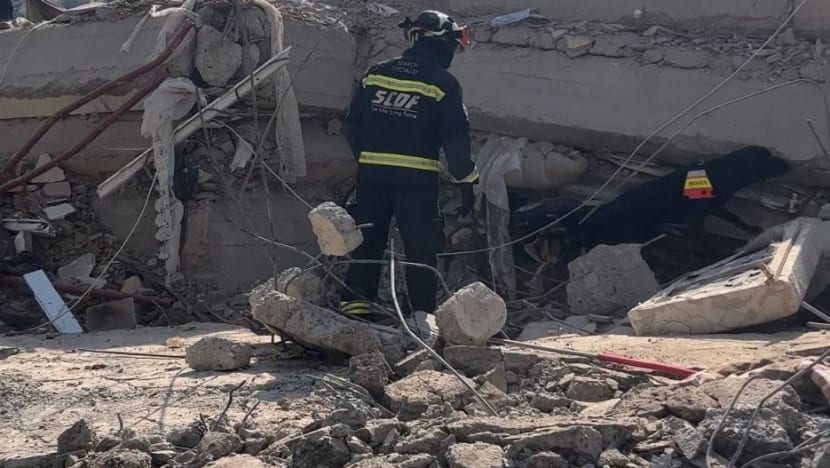'We are tired' but 'morale remains high': SCDF team in Türkiye assisting with quake rescue operations

Col Chew Keng Tok, Contingent Commander, briefing two teams prior to their deployment in the city centre to conduct assessment operations., and a pair of officers conducting their operations. (Photos: Facebook/Singapore Civil Defence Force)
SINGAPORE: The Singapore Civil Defence Force (SCDF) officers involved in quake rescue efforts in Türkiye "are tired" but "morale remains high", said the leader of the 68-member contingent on Sunday (Feb 12).
"The first team that was into ground zero was literally working round the clock, non-stop, for a good 72 hours," said Col Chew Keng Tok in a media interview on Sunday.
"And there(in) lies the rescue of the two live victims," he added.
The 20-member advance team arrived in southern Türkiye on Wednesday, and assisted local emergency services with the rescue of a Türkiye-Syria earthquake victim on Wednesday evening. The team also successfully aided in the rescue of another victim on Thursday.
Speaking from Operation Lionheart's base of operations in Kahramanmaras, Col Chew said morale remains high after these rescues.
With the arrival of the second team of officers from Operation Lionheart on Friday, Col Chew said that teams are now being split up to ensure adequate rest before the officers' deployments.
There are also two psychologists who are part of the contingent, said SCDF, adding that they are there to watch over the mental well-being of the team.
This is the first time that psychologist have been sent as part of a Operation Lionheart contingent, according to SCDF.
The devastating earthquake has so far killed more than 28,000 people, with the United Nations expecting the death toll to at least double.


"One of the main challenges we're facing over here is the weather," said Col Chew when asked about obstacles the team from Singapore had to overcome.
The temperature would drop to as low as 6 degrees Celsius during the day and that it would drop even lower in the night to about -6 degrees Celsius, he added.
"(Our) personnel's ability to operate in such conditions is (also) definitely a big challenge," he said.
Understanding and being culturally sensitive to the "do and don'ts" of the area the team is working in is also a challenge, he noted.
TRAINING "SUFFICIENT" TO METE OUT ASSISTANCE
Col Chew also mentioned how Urban Search and Rescue (USAR) Methodology remains the same as the contingent moves from mission to mission.
SCDF prepared five portable power generators, as well as 24 boxes of transportation carriers containing USAR equipment (cutting/breaking/lifting/stabilising equipment), medical supplies, field rations, and tentage to be brought over to Türkiye.
To support the contingent’s enhanced USAR operations, they brought additional search and rescue equipment, medical supplies, and communications and logistics support equipment.
The training done in Singapore is "sufficient" to mete out assistance to countries affected by earthquakes, he added.
He also said that differences in how operations may be conducted depends on what the buildings in affected areas are, either high-rise buildings or low ones.
Col Chew said that Kahramanmaras, the city they were deployed to over the past few days, was mostly filled with residential buildings with an average height of six storeys.
He said that they know their way round conducting rescue operations in the terrain, since they have attended to similar structures before, "so it's not new".
KEY TO MISSION IS TO LOCATE LIFE
The key to urban search and rescue missions is still to locate life, said Col Chew during the interview.
"When we are able to that, that means we are able to continue to save lives between the damages and the rubbles", he said.
A lot of work has been done in the city centre, with coordination efforts with the local Turkish authority and the United Nations, he added.
He said that now, the team is starting to be deployed more outside the city centre "to continue to do assessments in terms of survival (chances) within the rubbles".
That is the next continuous thing the contingent will do in assisting with the efforts, he said.
Col Chew said that locals in the country have been warm towards them and other international organisations aiding rescue efforts, and are constantly thanking them for their efforts.
"Even in the midst of their grief and their sadness, they're very forthcoming and they're very strong people ... and I salute them."
He added that his team will assist the local authority as long as the need is required.
"We often work very closely with the coordinators here. As long as they need us to be around, we will try to be around for them, to render assistance to them," he said.

















